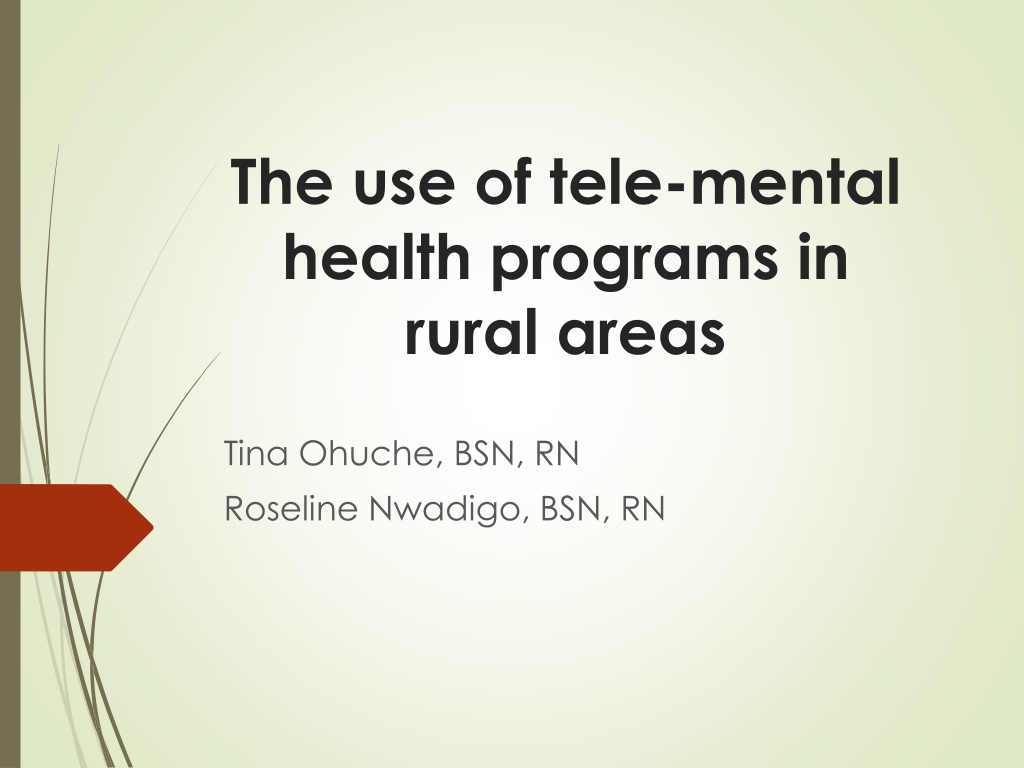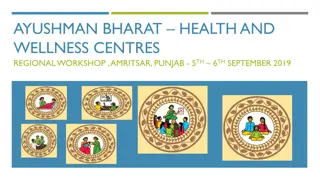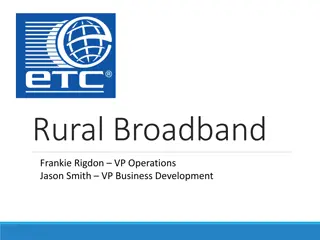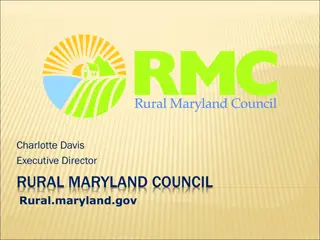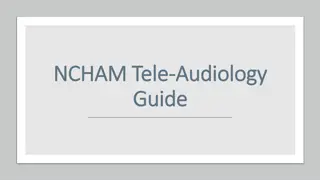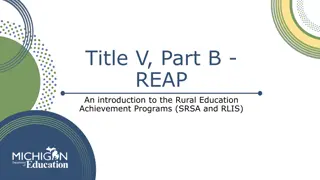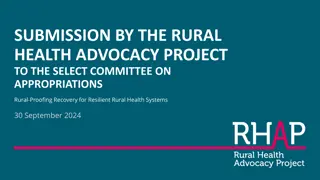Transforming Mental Health Care in Rural Areas through Tele-Mental Health Programs
Tele-mental health programs utilize various technologies such as web-based interventions, mobile phone communication, video-conferencing, and internet games to provide psychiatric mental health services to patients in remote areas. Best practices include ensuring patient privacy, encryption of messages, and provider credentialing. Organizations like the American Telemedicine Association offer guidelines for the implementation of tele-mental health services.
Download Presentation

Please find below an Image/Link to download the presentation.
The content on the website is provided AS IS for your information and personal use only. It may not be sold, licensed, or shared on other websites without obtaining consent from the author. Download presentation by click this link. If you encounter any issues during the download, it is possible that the publisher has removed the file from their server.
E N D
Presentation Transcript
The use of tele-mental health programs in rural areas Tina Ohuche, BSN, RN Roseline Nwadigo, BSN, RN
Definition Tele-mental health (TMH) care is a multidisciplinary approach, that is based on the use of computer sciences, and information technologies to render psychiatric mental health services to patients. It also seeks to facilitate mental health services at remote clinical sites.
Available Technologies Web-based interventions this is similar to the face-to-face interactions a patient gets with their mental health care provider (MHCP). This is done by means of textual, audio-visual, and animated programs. During these sessions the provider has the choice of providing either psychotherapy sessions and/or medication management. There are interactive tools for feedback to enhance the client s experience. Mobile phone technology this is a means of communication in which the MHCP and clients use to exchange messages via texts, video, and audio.
Available technologies Video-conference, telephone and messaging systems this can be through emails, video calls, and instant messages using the computer. Networking by social media and group discussions this refers to the use of digital, web- based technologies to promote information transfer and communication among patients and therapists.
Available Technologies Internet games Some games can motivate patients, promoting positive changes in abnormal behaviors resulting from mental health disorders. It can serve as a remedy for some disorders, such as autism, hyperactivity, and aggressive personality behaviors. Simulated people and places this uses three dimensional, animated video presentations in providing treatment and support in mental care.
Best Practices American Telemedicine Association (ATA), is a non-profit organization established in 1992 to advance standards of telemedicine, and have added specific practice guidelines for TMH. The American Psychiatric Association, and the American Psychology Association also have guidelines that governs the use of TMH in practice.
Best Practices Points that should be addressed before using TMH are; Patient s privacy and confidentiality- this is the first concern in the use of TMH, or any form of patient care for that matter. Security encryption of messages is vital in between transmission to prevent interception during the process of transmission. Provider credentialing for clinical privileges and licensing across state lines
Why Tele-mental Health? There are 35 counties in North Carolina known as mental health professional shortage areas TMH can help allocate scarce resources to the underserved areas With TMH, patients length of stay in emergency departments can be reduced TMH can help repeal unnecessary involuntary commitments by increasing patient access to providers Thereby, reducing costs to the state and federal government
Benefits Mental health and behavioral disorders have been ranked as the fifth costly group of diseases in the U.S. The provision of adequate healthcare services to patients with mental health disorders has been challenging due to the limited access to these costly services, therefore the benefit of TMH. Rural areas with insufficient mental healthcare providers have difficulties providing basic services to patients who need mental health care.
Benefits Cont. Improved access to services Reduced costs Flexibility under most circumstances, especially beneficial for patients with depression and substance abuse disorders. Interactive sessions between clients and clinicians. TMH care is particularly warranted for under- developed, and rural communities that do not have local services.
Challenges Regulatory and ethical concerns about the use of internet and telecommunication services which may put the client s privacy at risk because others may be within hearing distance of the treatment sessions. Clients with physical and cognitive disabilities may not be able to use the services successfully.
Challenges Subscribing to internet services may pose a challenge to some. Ability to use the needed technology is necessary for both the provider and client. Reimbursement issues as services may not be covered by certain insurance policies. Initial cost of obtaining the needed equipment and maintaining periodic updates.
References Adams, S. M., Rice, M. J., Jones, S. L., Herzog, E., Mackenzie, L. J., & Oleck, L. G. (2018). TeleMental Health: Standards, Reimbursement, and Interstate Practice. Journal of the American Psychiatric Nurses Association, 1078390318763963. Fortney et al. (2015). Telepsychiatry integration of mental health services into rural primary care settings. Retrieved from https://www.ncbi.nlm.nih.gov/pubmed/26634618 Langarizadeh, M., Tabatabaei, M. S., Tavakol, K., Naghipour, M., Rostami, A., & Moghbeli, F. (2017). Telemental Health Care, an Effective Alternative to Conventional Mental Care: a Systematic Review. Acta Informatica Medica, 25(4), 240 246. http://doi.org/10.5455/aim.2017.25.240-246 N.C. Department of Health and Human Services. (2017). North Carolina telepsychiatry program. Retrieved from https://files.nc.gov/ncdhhs/documents/2017%20NC%20DHHS%20O RH%20Telepsychiatry%20Program%20One%20Pager.pdf Ulzen, T., Williamson, L., Foster, P. P. & Parris-Barnes, K. (2013). The evolution of a community-based telepsychiatry program in rural Alabama: Lessons learned-a brief report. Retrieved form https://www.ncbi.nlm.nih.gov/pubmed/22322325
